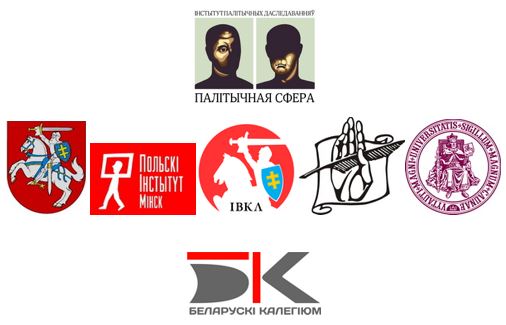5th Minsk Conference of the Institute “Political Sphere” ‘Nation at the Time of Crisis. National interests, identity, national idea and national politics in Central and Eastern Europe after 2008’, 13-14 May 2016. If you want to visit the conference as a guest, please fill in the registration form due to 8 May.

Institute “Political Sphere” (Belarus-Lithuania)Embassy of the Republic of Lithuania in BelarusPolish Institute in MinskBelarusian CollegiumInstitute of the Grand Duchy of Lithuania (Lithuania)Vytautas Magnus University (Lithuania)Lithuanian Institute of History (Lithuania)
5th International Scientific Conference of the Institute “Political Sphere”
Nation during crisis. National interests, identity, national idea and historical politics in Central and Eastern Europe after 2008
12-14 May 2016
Embassy of the Republic of Lithuania in Belarus
Minsk, Zacharava st. 68
12 MAY
18.30-20.30 – Crown Plaza Hotel (Minsk, Kirava st. 13).
Public discussion “The phenomenon of Belarusian nation: experience of intellectual thought after 2000″ (in memory of Uladzimir Abušenka)” (speakers tba).
13 MAY
Embassy of the Republic of Lithuania in Belarus, Minsk, Zacharava st. 68
10.00-11.45
Panel I. Politics of History
Alieh Dziarnovič (Belarus). Volatile image: Grand Duchy of Lithuania in the public opinion and official discourse of contemporary Belarus (1990 – 2015)
Tomasz Blaszczak (Poland-Lithuania). Toponymy of cities and decommunisation of public space in Poland after 2005
Vadym Stetsiuk (Ukraine). “Law on Decommunisation” and politics of history in contemporary Ukraine: challenges to implementation
Aliaksiej Lastoŭski (Belarus). Soft Belarusianisation of historical politics
11.45-12.00 Coffee break
12.00-14.00.
Panel II. Politics of History (Part 2)
Katarzyna Kącka (Poland). Politics of history in the time of crisis
Andrei Iserov (Russia). Problems of teaching Russian history in universities
Paviel Cieraškovič (Belarus). National university in the 21st century
Dangiras Mačiulis (Lithuania). Cinema to the east of Oder: a tool of representation of collective memory or a weapon of historical politics?
Aliaksandr Paharely (Belarus). Use and abuse of crisis. Crisis diagnosis in the press of interwar BCHD-BNA and its relevance today
14.00-15.00 – Dinner
15.00-16.30
Panel III. National identity
Andrzej Szpociński (Poland). New trends in culture and national feelings
Adam Balcer (Poland). Islamophobia and nationalism in Central Europe
Gaziz Shaimerden (Kazakhstan). National identity of the Kazakh irredenta: setting the problem
Kazimierz Wóycicki (Poland). Local identity, translation of cultural heritage and national consciousness. The case of one town in Lower Silesia and an attempt of generalisation
Ihar Rasoĺka (Belarus). The structure of national identity of the Belarus population in the European context: experience of comparative multivariate analysis
Iryna Matsyshyna (Ukraine). The issue of the “friend-foe” concept: Ukrainian dimension (semiotic analysis)
16.30-18.00
Panel IV. New forms of identity
Nataliia Steblyna (Ukraine). National relations and local media: the geography of Internet news in Lviv and Odesa
Iuliana Matasova (Ukraine). The ‘workings’ of the Female in Ukrainian popular music of the 1990s-2010s: attempts at implementing the national Desirable.
Aliaksandr Lanieŭski (Belarus-Poland). Anarchism in times of crisis: the case of Belarus
Uladzislaŭ Ivanoŭ (Belarus-Lithuania). Language, culture, sports as potential soft power of the state (why and how Belarus ignores the potential of soft power?)
Anton Sajfullajeŭ (Poland). Semi-peripheral – postcolonial – authentic. The race for the postmodern form.
18.30-20.30 – Crown Plaza Hotel (Minsk, Kirava st. 13).
Public discussion “Nations and states of Eastern Europe – the prospect of 2026”. Participants: Alfredas Bumblauskas (Lithuania), Andrej Kazakievič (Belarus), Heorhiy Kasyanov (Ukraine), Alexei Miller (Russia).
14 MAY
Embassy of the Republic of Lithuania in Belarus, Minsk, Zacharava st. 68
10.00-11.45
Panel VI. Historical disputes and international relations
Alexei Miller (Russia). The clash of Western and Eastern European memory cultures
Georgi Kasianov (Ukraine). History at war and war of histories: Ukraine – Russia, the beginning of the third millennium
Alfredas Bumblauskas (Lithuania). ULB or what do Vilnius University in 1579, Mahilioŭ baroque of Glaubitz, Kyiv-Mohyla Academy and Donetsk front in 2015 have in common?
Rūstis Kamuntavičius (Lithuania). History of Belarus written by a Lithuanian author: how can it look like?
Ludwika Włodek (Poland). The reactions of the population of Polish Spisz to the cult of “the damned soldiers”
12.00-14.00
Panel VII. Historical disputes and international relations (Part 2)
Gennadii Korolov (Ukraine). Between Germany and Russia: Oskar Halecki’s concept of Central and Eastern Europe
Grzegorz Klein (Poland). Polish extreme right-wing movements’ vision of the Ukrainian conflict
Piotr Szczepanik (Poland). Conflict in eastern Ukraine in the historical consciousness of Poles
Magda Pabin-Majchrzak (Poland). Russian imperial dream: from tradition to contemporary politics
Bogdan Zawadewicz (Poland). The role of external actors in Serbian party politics after 2008
Aleksandra Kotowska (Poland). Illegal immigration from North Africa as a challenge for the internal security of the European Union
Download Conference prog_eng
 Інстытут палітычных даследаванняў "Палiтычная сфера"
Інстытут палітычных даследаванняў "Палiтычная сфера"
